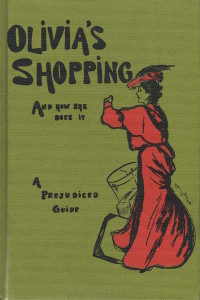 Now that the January sales appear to be in full swing it might be valuable to take the advice of the pseudonymous ‘ Olivia ‘, a copy of whose ‘ prejudiced guide to the London shops ‘of 1906 cropped up in a pile of books. This chatty and opinionated, and possibly American-born, veteran of West End emporia, took retail therapy to new heights in her search for quality, elegance and good value. Here’s what she has to say about the vexed matter of sales.
Now that the January sales appear to be in full swing it might be valuable to take the advice of the pseudonymous ‘ Olivia ‘, a copy of whose ‘ prejudiced guide to the London shops ‘of 1906 cropped up in a pile of books. This chatty and opinionated, and possibly American-born, veteran of West End emporia, took retail therapy to new heights in her search for quality, elegance and good value. Here’s what she has to say about the vexed matter of sales.
The magic word that stocks our wardrobes, deletes our purses, disorganizes our routine, fascinates us, repels us, delights us, disappoints us twice a year regularly in London—for how much is it not answerable?
The ethics of sales are so disturbing, one time so morally and clearly good, the next minute so conspicuously disappointing and bad, that no woman, I believe is quite settled in her mind regarding them.
Personally, I find it a delightful thing to buy a pretty piece of stuff ‘marked down ‘.Even when I can buy the same thing fresh and by the yard, and at the identical price, it never thrills as does that remnant with the wrong amount of yards, the torn edge, and the marked down price. There is no doubt we all love a bargain, even when it is only on paper.
This trait in our feminine character is fully appreciated by the shopkeeper. Therefore, there are sometimes disappointments to be encountered at sales. On the other hand, some of us attempt to remain level-headed in the matter, and are not to be won over.
Correspondingly, sales are our happy hunting- grounds. Taken in a sensible way, sales are a necessity to the modern woman, just as they are a necessity to the modern shopkeeper. They are to her the stock-making time, just as they are the shopkeeper’s stock-taking. She gracefully relieves him of the things which would not last another season’s shop wear, but are quite ready for being exhibited elsewhere. The best policy for a woman is to frequent the places at sale-time which are barred by expensiveness in the full season. Good houses really reduce their prices, and sell the goods which they have already selected with care and supreme judgement at wonderfully lowered prices. It is to their advantage to sell these at the end of a season. But only the finest houses can afford to let prices go down very far for a mere fashion. One has to remember this at sale-times. The shops which have no tremendous stock of things certainly must find themselves out of ‘sale and surplus ‘ stock just at the most exciting times and at this point no doubt buy wildly those ‘ especially cheap lines ‘ prepared by manufacturers for such an emergency.
Then one may buy reticules by the half-dozen at a shilling each which had better never been seen in London; rustling silks of brave appearance and tinselly quality are rushed out with avidity. The fever of the bargain gets on the crowd, and the fight begins. At the end of the day the weary fighters look over their wares at home.
Alas! The reticules are already showing signs of leakage, the rustling silks demonstrate where the first cuts will appear. Life becomes a horrid mockery to the time of so many shillings wasted. The day is closed with feminine and forcible maledictions on the ethics and practices of sales… [RR]
